Burr Ridge, IL (MW Communications) At its 47th Diocesan Assembly which took place here October 6 & 7, 2009, the assembly passed Clergy Compenastions Guidelines to be followed by all parishes of the diocese. Those guidelines can be found here.
The rationale for the adopted guidelines follows:
There is no active clergy compensation policy in our diocese. Compensation packages among our clergy reflect no systematic consideration for tenure, education, size of parish or relative fairness. The most recent diocesan policy was established by the late Bishop BORIS in 1985 (which, by the way, requires that a newly ordained and assigned priest receive a minimum of $800.00 per month in salary). That policy, along with the O.C.A. clergy Compensation Guidelines dating from 1992, became the foundation for this current proposal. Since much of the “package” was already intact, the pressing question for the committee to address was simply “how much money should we pay the priest?” or “what is fair and reasonable compensation to both the Pastor and the parish?
At the January 2005 meeting the Chancellor and committee agreed that the compensation model for a public school teacher was both viable and desirable. Built into most school district policies were the variables of tenure and education. Demographic and cost of living differences across the diocese could be easily addressed by simply using local school pay scales for each parish. The committee left that meeting with the intention to follow the school model course for a diocesan wide compensation policy, tailoring the school compensation information into our existing package.
At the August 2007 meeting concerns were raised, particularly by the priests, that meeting the costs of the school salary schedules in most of our parishes would simply be impossible at this time. Reviewing the data from the recent clergy compensation survey conducted by Joe Kormos earlier in the year, the anticipated net increase of cost to a parish is quite intimidating. Since a policy which establishes the impossible as a norm is destined to be marginalized and ignored, it was necessary to adjust the model.
The following guideline is based on the Medium Household Income (MHI) of the county in which the parish is located. Consideration for tenure is built into the process, while adjustments for parish size are strongly encouraged. A number of elements of the policy are beyond the scope of diocesan manipulation, e.g. FICA requirements, and O.C.A. mandated pension, life insurance and health care coverage. Additional suggestions for “perks” to a deserving and well respected pastor are also made.



